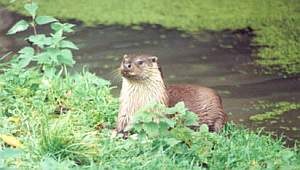Otters do not exist in the vast numbers as suggested in recent claims across the media, with a UK population quoted of being around 10,000 animals. There is no scientific evidence for this figure – it is just an educated guess.
Naturally, because of the publicity there are growing concerns from fisheries relating to otters, and their impact on fish stocks. Otters may have a local impact, but there are clearly other reasons for reduction in fish stocks and these should also be taken into consideration. Otters and fish are vital elements of freshwater ecosystems, it is therefore important to maintain biodiversity.
In order to address the gap in evidence and establish accurate information, the International Otter Survival Fund, based on Skye, is spearheading an initiative to establish a working group of otter experts and representatives from the fishery community. This will ensure that up-to-date and precise data can be gathered, practical advice can be gained, and solutions provided for current problems.
To determine the way forward, the IOSF have scheduled a one day conference bringing together interested parties from across the UK and Europe – otter scientists, representatives from fishery organisations, wildlife trusts, environmental, biodiversity and conservation agencies, fish farmers, koi carp keepers and anglers, as well as representatives from organisations from Austria and the Czech Republic who have been involved in compensation schemes. An invitation to attend is not required – delegates from either field are welcome to attend.
 Otter photograph by Mary Heathcote
Otter photograph by Mary HeathcoteDr Paul Yoxon, IOSF Head of Operations, said “The data simply isn’t available to say that otters are everywhere. On the one hand we are being told that there is a drought and fish are having to be rescued from drying rivers and on the other hand we are hearing that there are loads of otters. Both cannot be true. But instead of arguing we want to work WITH people involved in fishing to resolve conflicts before they become serious. We hope as many fishermen as possible will join us and help us preserve fish stocks, otters and the biodiversity of our country.”
Amongst the subjects contained in the conference programme are:
- otter ecology, population numbers and distribution (past and present), survey methods, and the legal protection of the species.
- threats to fish stocks – environmental damage to rivers, drought conditions, disease, other predators (including invasive species).
- fishery concerns – how to protect fish stocks.
- working with otters – an example will be presented from a Scottish fishery, who is successfully encouraging wildlife (including otters).
Following the conference, a working group of interested parties will be formed to agree the way forward for further data to be gathered and more mutual collaboration. It is envisaged that the group will comprise 10 members across the otter and fishery community.
The conference is taking place on Wednesday, 7 November 2012, at the Apex International Hotel, Edinburgh – with the first working group meeting scheduled for early 2013.
Conference delegates can book online at:
http://www.ottershop.co.uk/PBSCCatalog.asp?CatID=1654751
For more information:
http://www.otter.org/events.aspx or email: enquiries@otter.org








